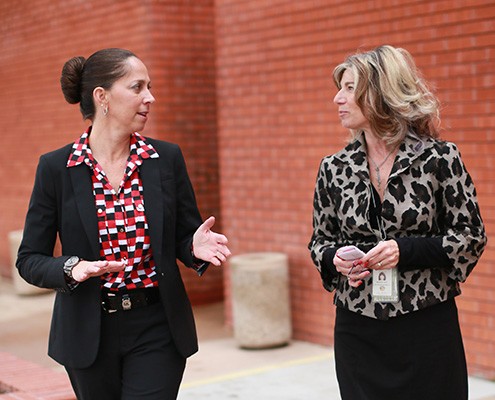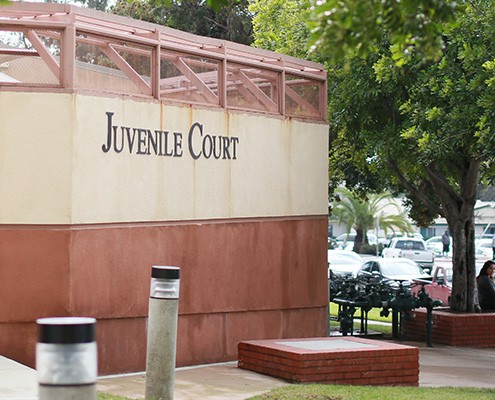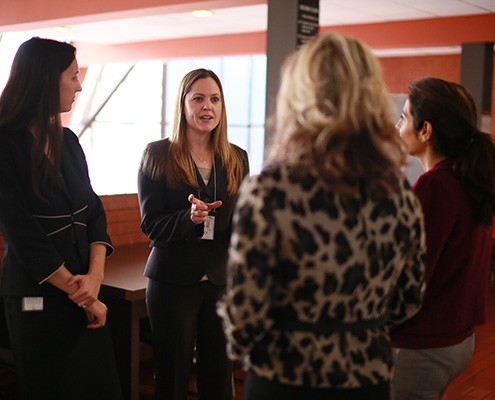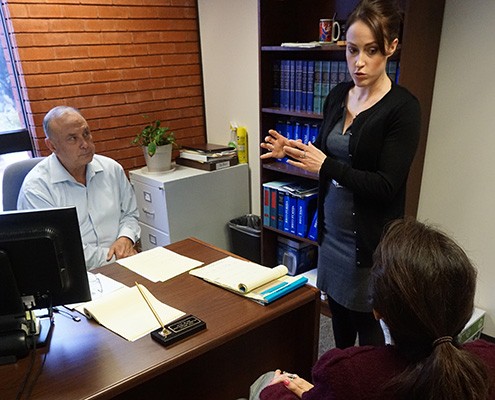| 2017 Staffing | |
|---|---|
| Attorneys | 20 |
| Investigators | 2 |
| 120 Day Investigators | 1 |
| Process Servers | 0 |
| Paralegals | 7 |
| Support Staff | 18 |
| Student Workers | 4 (2 year around, 2 summer only) |
| Victim Witness Advocates | 2 |
| 120 Day Attorneys | 4 |
| Total | 59 |
Criminal Cases Submitted For Review
Felony Petitions Filed
Misdemeanor Petitions Filed
WI 707 File Petitions
Direct Filed Cases
Truancy Petitions Filed
The Juvenile Division of the San Diego District Attorney’s Office promotes family-focused interventions for youth under 18, who become involved in the criminal justice system. While still keeping our community safe, we are using new and diverse approaches to help our justice-involved youth succeed in life. Working with law enforcement, the courts, Probation, Health and Human Services and multiple community organizations, we use evidence-based practices to ensure the most successful outcome for all. Diversion programs offered through local law enforcement agencies and the Probation Department, for example, ensure youth are obtaining the necessary services within their own communities rather than in custody. These diversion programs work with the justice-involved youth and their family to educate the youth and prevent future law violations.
We have also enlisted organizations trained in restorative circles to correct the juvenile’s behavior through discussion, mentoring and education, while also making reparations to the victims for their losses. In addition, we have increased our prevention work by educating San Diego youth through school presentations on the law, and the pitfalls or dangers cyber-bullying, teen relationship violence, social media, commercial sexual exploitation of children, human trafficking, and many other topics of interest. These presentations also help parents, teachers, school administrators and mentoring organizations, such as Big Brothers/Big Sisters, to identify and respond to issues today’s youth are dealing with.
In cases where diversion and restorative circles are not appropriate or have not been effective, after traditional prosecution, we use one of the many specialty courts we helped create. They include Juvenile Mental Health Court, Drug Court, Truancy Court, RISE Court and Teen Court. Each of these court programs increases support and services for the high-risk/high-needs youthful offenders.
The Juvenile Division is broken down into specialty units, allowing our prosecutors to become subject matter experts and creative problem solvers. The units include Issuing, Calendar, Motions, Trial, Truancy, Drug Court, Gangs, Human Trafficking and Sexual Assault/Family Violence.
Issuing
In this unit, Deputy District Attorneys review reports submitted by police agencies to determine whether a crime has occurred. At the time of issuing, a Deputy DA will review each minor’s prior criminal history and statistical information to determine his or her eligibility for diversion, restorative justice, deferred entry of judgment and/or informal supervision by the County Probation Department. If the prosecutor determines that charges should be filed against the minor, those charges will be included on the charging document, which is called a petition.
Calendar
In 2017, the Juvenile Court’s delinquency departments were reduced from four to three. This reduction is due in part to fewer juveniles in the system and the success of the best practices we used with our partners, the Court, Probation Department, Public Defenders, and law enforcement. Each courtroom is assigned a Deputy District Attorney who appears on the cases on behalf of the People of the State of California. The Calendar Deputy District Attorney reviews police reports, probation reports and other documents when making arguments to the court on how a minor’s case should be resolved.
 Motions
Motions
The team consists of a team leader, an assigned Deputy DA and legal interns. The Motions Team handles arrest warrants and the majority of pre-trial motions filed with the court. The bulk of the motions are being filed under the California Welfare and Institutions Code Section 654 (informal supervision). However, there are a variety of other motions filed, including evidence suppression, requests for probation modification, plea withdrawal, speedy trial, and sealing. The Motions Team also assists the division with appellate issues and motions for modifications on Proposition 47 cases, which allowed for certain felony crimes to be reclassified as misdemeanors and their imposed penalties recalculated.
Trial
This team handles all disputed matters, including, but not limited to, trials, evidentiary hearings, restitution hearings, contested dispositions and prima facie hearings. Trial Team deputies review police reports, determine which witnesses should be subpoenaed, prepare the case for hearing, conduct the hearing and appear at the disposition hearing (sentencing) in cases where the minor is found to have committed a crime.
Human Trafficking
This team fights against the commercial sexual exploitation of children (CSEC) in San Diego County, through prevention, education, protection and prosecution. Deputy DA Fanny Yu leads this team. She trains law enforcement agencies, social workers with Child Protective Services, behavioral health and the medical community, school staff, students and parents, as well as the community at large. As the CSEC liaison, Deputy DA Yu works closely a number of agencies, including Juvenile Court, Probation, Child Protective Services, victim services organizations such as STARS and North County Lifeline, the Human Trafficking Task Force, public defenders, and dependency attorneys, to identify minors who have been victimized or are at risk for victimization. The minors are assessed for safety and the team develops a case plan. They also handle juvenile delinquency cases involving minors who have been recruited, exploited or who are at high risk for exploitation, as well as juvenile offenders who exploit or recruit victims. An important part of Deputy DA Yu’s role as the Human Trafficking Team Leader, is being informed and educated on CSEC and human trafficking legislation and effectively representing the DA’s Office on CSEC committees and steering groups in developing child sexual exploitation protocols.
During 2017, we created RISE (Resiliency is Strength and Empowerment) Court with our justice partners. It is a specialty court created for delinquents who are victims, or at risk of becoming trafficking or sexually-exploited victims.
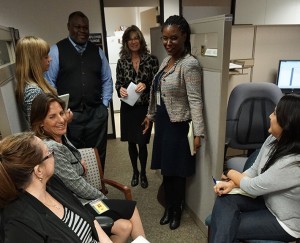 Sexual Assault / Domestic Violence
Sexual Assault / Domestic Violence
This team handles cases related to sexual assault, pornography, sex trafficking, child exploitation, sexting, child abuse and domestic violence among teens. Three Deputy DAs from this team and handle all cases and hearings. The team issues cases after reviewing police reports and victim interviews. They handle detention hearings, readiness hearings, settlement conferences, trials, probation violations, motions to seal records and disposition (sentencing) hearings. The team works closely with the victim advocate assigned to the Juvenile Division, and law enforcement agencies throughout the county on juvenile law as it relates to this type of case. The team also collaborates with Probation’s Juvenile Sex Offender Management Unit, Child Welfare Services, and certain victim services organizations on these sensitive cases.
There are five specialized calendars in Juvenile Court: Dual Calendar, J-Fast, Truancy, Drug Court and RISE.
Dual Calendar
This calendar consists of minors who have an active dependency case and a new delinquency case. In some situations, a minor can be supervised by both Probation and the Health and Human Services Agency, with one court addressing their needs from both jurisdictions at the same time.
J-Fast
J-Fast, is a youth behavioral health court, which handles cases where a minor has a delinquency case and mental health issues that are hindering him or her from being successful while on probation. In addition to the assistance received by a minor through the traditional justice partners (the judge, defense attorney, probation officer and district attorney), minors and their families are also provided support in the form of wrap and mental health services. Wrap services include a parent partner and youth partner to help the family and minor address family issues and obtain services.
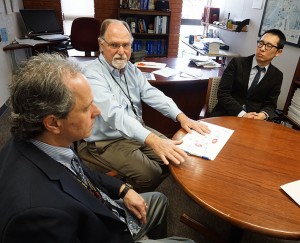 Truancy
Truancy
Once a week, the truancy team handles cases during a specialized calendar at the Juvenile Courthouse and once a month at the Vista Courthouse. Truancy partners include the San Diego County Office of Education, all 42 school districts in San Diego County, the offices of Probation and the Public Defender, law enforcement agencies, drug treatment facilities, Vista Hill, community-based organizations, mentors, and the Children’s Initiative. The truancy team leader works closely with school districts at attendance review hearings, by providing mediation services for elementary school districts, and through assisting schools and families with programming and support to keep students from being referred to truancy court. Mediation services expanded in 2017, with the truancy team leader meeting with school representatives, truant children and their parents to help resolve issues that create barriers in school attendance.
Drug Court
This court provides comprehensive drug and mental health treatment within a probationary setting. The Drug Court calendar is held twice a week at the Juvenile Court and one day a week at the Vista Courthouse. The Drug Court Team includes judges, a Public Defender, a District Attorney, Probation Officers, two therapists from SAY San Diego and substance abuse professionals. The goal is to identify minors whose criminal conduct is primarily motivated by drug or alcohol abuse issues and who have not done well with traditional probation intervention. Once identified, we rehabilitate juveniles with an emphasis on intensive substance abuse therapy.
RISE
This specialty court provides individual treatment plans for youth who have delinquency petitions and who have also been victims of human trafficking or sexual exploitation. Our office works with the Court, Probation, Public Defender, and Social Services to create individual treatments and to stay with the juvenile every step of the way to ensure success.
Additionally, to ensure that crimes with the highest potential to significantly affect the public are handled in an efficient manner, certain cases are assigned to one prosecutor for the length of the case, meaning, one Deputy District Attorney handles the case from beginning to end.
These types of cases include:
- Human Trafficking
- Arson
- Drug Court
- Mental Competency
- Teen Relationship Violence (TRV) and Sexual Assault
- Truancy
- Gangs
- Murder
In 2017, the Juvenile Division handled a variety of crimes such as simple misdemeanors, robberies, residential burglaries, drug smuggling, undocumented immigrant smuggling, sexual assaults, arson and murder. The division works closely with juvenile justice partners throughout the county to ensure the highest level of services are available to the youth in every part of San Diego in order to provide appropriate rehabilitative services and reduce recidivism. The juvenile justice system is focused on evidence-based practices and trauma informed care. We have been successful in reducing crime and recidivism. In order to incorporate these theories into juvenile justice, the Juvenile Division’s Chief and Assistant Chief attend numerous probation and community programs to include Crossover Youth Project, Positive Youth Justice Initiative, Alternatives to Detention, Graffiti Arts Mural Project, Probation Tattoo Removal Program, and the Mid-City Restorative Justice Mediation Project. Juvenile Chief Lisa Weinreb is also a member of the Juvenile Justice Coordinating Counsel. She gives regular updates to the Juvenile Justice Commission and is on the Board of Mental Health America and the International Bipolar Foundation. Assistant Chief Shawnalyse Ochoa presents at Passport to Life and helps sustain the County Probation Department’s Gang Tattoo Removal program.
The District Attorney’s Office is proud to report that juvenile crime is down from previous years. We continue our commitment to crime prevention through our speakers’ bureau, through which our Deputy DAs provide educational talks at schools throughout the county on cyber safety, teen dating violence, human trafficking, and bullying. Additionally, we support using restorative practices to resolve low-level criminal offenses. We volunteer at local elementary schools through programs such as Success Agents and Project Lead to support the educational goals of San Diego youth and to create positive experiences with law enforcement.

